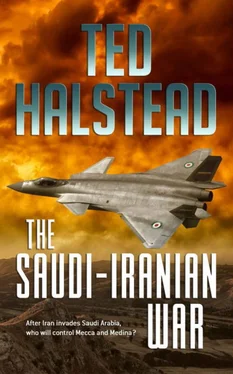Ted Halstead - The Saudi-Iranian War
Здесь есть возможность читать онлайн «Ted Halstead - The Saudi-Iranian War» весь текст электронной книги совершенно бесплатно (целиком полную версию без сокращений). В некоторых случаях можно слушать аудио, скачать через торрент в формате fb2 и присутствует краткое содержание. Год выпуска: 2019, Издательство: Independently published, Жанр: Боевая фантастика, Триллер, на английском языке. Описание произведения, (предисловие) а так же отзывы посетителей доступны на портале библиотеки ЛибКат.
- Название:The Saudi-Iranian War
- Автор:
- Издательство:Independently published
- Жанр:
- Год:2019
- ISBN:нет данных
- Рейтинг книги:4 / 5. Голосов: 1
-
Избранное:Добавить в избранное
- Отзывы:
-
Ваша оценка:
- 80
- 1
- 2
- 3
- 4
- 5
The Saudi-Iranian War: краткое содержание, описание и аннотация
Предлагаем к чтению аннотацию, описание, краткое содержание или предисловие (зависит от того, что написал сам автор книги «The Saudi-Iranian War»). Если вы не нашли необходимую информацию о книге — напишите в комментариях, мы постараемся отыскать её.
The Saudi-Iranian War — читать онлайн бесплатно полную книгу (весь текст) целиком
Ниже представлен текст книги, разбитый по страницам. Система сохранения места последней прочитанной страницы, позволяет с удобством читать онлайн бесплатно книгу «The Saudi-Iranian War», без необходимости каждый раз заново искать на чём Вы остановились. Поставьте закладку, и сможете в любой момент перейти на страницу, на которой закончили чтение.
Интервал:
Закладка:
There was no way to know who fired because of Vahid’s words, or simply in self-defense. In the end, it didn’t matter.
When Ali’s tanks came upon the scene later that day they met no resistance. Every tank and APC in Hamid’s force was either destroyed or, as in the case of the Armata, too badly damaged to move. Only a dozen Iranian soldiers were found alive, nearly all wounded, except for one sitting in a daze next to his tank.
Ali did as he had been ordered with all survivors, which was to transfer all of them to the same prison run by the Interior Ministry where the Qataris had been sent. Ali was never told but assumed, correctly, that they were all executed.
In fact, Vahid’s threat to the families of the men in Hamid Mazdaki’s force had been a bluff on two counts. First, the American President had made it clear he would never agree to provide Vahid with an audio feed for that purpose, or video surveillance to help him carry it out. Vahid had explained, and then promised, that no harm would come to the families of the Iranians fighting in Saudi Arabia before the Americans agreed to broadcast his message.
Probably more important was that Vahid would have never carried out the threat, even if he’d had the opportunity. Indeed making the threat, and particularly doing it with enough menace in his voice to make it convincing, had nauseated him to the point that he was nearly unable to complete the broadcast. Only knowledge of the bloodshed and misery that would have followed an Iranian assault on downtown Riyadh had forced him to swallow his bile and finish the revolting message. That, and the fact that Reza Fagheh would have never hesitated to carry out such a threat, if he had been allowed to live.
Chapter Thirty One
Grand Ayatollah Sayyid Vahid Turani looked out at the massed television cameras, and thought about the millions of Iranians who would be watching him on every channel. Not to mention the millions more who were likely to be following his every word in other countries. There was nothing like responsibility for the first use of nuclear weapons against a live target since World War II to get people’s attention, he thought bitterly. The man behind one of the cameras held up his right hand and silently began folding back first his thumb, and then the rest of his fingers one at a time.
Somehow, Vahid found the primitive countdown in the face of the assembled technology before him comforting. When the man’s last finger was folded, small red lights winked on in the front of all the cameras.
Vahid had assumed his sternest expression for the start of his address. “My fellow citizens, I am here tonight to inform you of a terrible crime that has been committed against our brother Muslim nation of Saudi Arabia, and to tell you of many changes happening as we speak to ensure such an outrage never takes place again.
“The nuclear and chemical weapons used against the Saudis by the criminals who have now been executed were the only ones we had. We will permanently stop and dismantle our nuclear and chemical programs in all their forms including power production, and invite United Nations inspectors to verify compliance. These inspectors will have full and unrestricted access to all Iranian territory, including military bases, without exception and with no need for prior notice.
“Though only the criminals we have executed knew of this cowardly plot, the Iranian government nevertheless takes full responsibility for their actions, and stands ready to provide full compensation to their victims.
“The criminals took advantage of a military structure that was too complex to be effectively controlled. Steps are underway to restore the central government’s control of all Iranian armed forces.”
Indeed, the Pasdaran and Basij leadership was being arrested nationwide, in a move so swift that there was little resistance. Some would be discharged.
Some would eventually be integrated into the regular Iranian military, as would all of their equipment.
Some would be executed.
Now Vahid’s expression softened and became more thoughtful. “For many years, we have sent our treasure abroad while Iranians at home were going hungry. That stops tonight.
“I am announcing the end of our military and financial support for all governments, militias and organizations outside Iran, including but not limited to those in Yemen, Syria, Iraq, and Lebanon.
“Iran’s military will only conduct operations within Iran and Iranian territorial waters and airspace as defined by international law. In particular, we pledge not to interfere with the free transit of vessels through the Straits of Hormuz.”
Now Vahid didn’t look merely stern, he looked threatening. “Do not mistake our restraint for weakness. Any weapons launched at us, including under the guise of ‘justified retaliation’ will be met with twice the firepower used against us. We accept responsibility. We do not accept the death of Iranians who had no role in the criminal attack against a fellow Muslim nation.”
Vahid’s expression shifted again, now appearing to see into the distance.
“Iran was a beacon of civilization thousands of years ago, when most people around the world had not yet discovered the written word. It can be that beacon once again. I pledge to you tonight that the government of Iran has rediscovered the true purpose of the Revolution, which is to make that government serve its people. In the days ahead I will be announcing more changes, all to help unlock the potential of our glorious nation.
“For now, though, I will content myself with this. May God bestow his blessings upon all of my fellow citizens, and may he protect the Islamic Republic of Iran.”
Vahid nodded to himself as the red lights on the cameras winked out. Next he needed to dismantle the corrupt clergy and government-owned corporate edifice that for so many years had stolen the money that ordinary hard-working Iranians needed to survive.
Once the UN inspectors had done their work and — probably grudgingly — agreed that Iran’s nuclear and chemical programs no longer existed, he had to be sure international sanctions were removed without delay.
And to help Iran return to the greatness that Vahid believed was truly its destiny, he had to find a way to integrate women into its society and economy, without allowing them to be turned into the sex objects he so despised in the West.
One step at a time, Vahid sighed to himself. One step at a time.
Dmitry Demchenko was nervous, and with good reason. Anyone at his rank of Assistant Director in the FSB had the right to request an urgent appointment with Director Smyslov. Since he had assumed leadership of the FSB, Smyslov had made it clear his door was open.
Once. If Smyslov decided there was nothing urgent about the request, at best the Assistant Director would find urgent appointment requests refused.
At worst, he would no longer be an Assistant Director. Smyslov was willing to forgive some things, but wasting his time was not one of them.
As Assistant Director for Recruitment most of Dmitry’s work was the very definition of routine. Today, though, a file had crossed his desk that made him want to break from that routine radically enough that it would require Smyslov’s approval.
As he was ushered into Smyslov’s office, Dmitry saw that the file he wished to discuss was already open on his desk. Smyslov waved him to the seat in front of his desk and asked with evident curiosity, “So, Dmitry, you wanted to speak to me about Neda Rhahbar. What did you have in mind? Recruiting her, I presume?”
Dmitry nodded. “Yes, sir. But I want to do so on an expedited basis, and put her in training immediately.”
Читать дальшеИнтервал:
Закладка:
Похожие книги на «The Saudi-Iranian War»
Представляем Вашему вниманию похожие книги на «The Saudi-Iranian War» списком для выбора. Мы отобрали схожую по названию и смыслу литературу в надежде предоставить читателям больше вариантов отыскать новые, интересные, ещё непрочитанные произведения.
Обсуждение, отзывы о книге «The Saudi-Iranian War» и просто собственные мнения читателей. Оставьте ваши комментарии, напишите, что Вы думаете о произведении, его смысле или главных героях. Укажите что конкретно понравилось, а что нет, и почему Вы так считаете.












